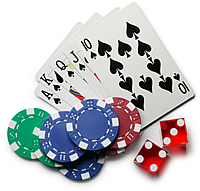Teen Gambling
Research from the Harvard School of Public Health and the Annenberg Public Policy Center seems to indicate a nearly 600% increase in gambling in post-secondary institutions between 2001 and 2005, with over 15% of students engaging in gambling each week in 2005. Although most of the gamblers are over 21, most first and many second year college students are still teens, and even if they are not active participants, this is part of the situation in which they are living. To understand more about teens and gambling, keep reading.
Understanding Teen Gambling
One of the problems with gambling is that it can start off with innocent competition, for example, two teens tossing a football or Frisbee and one says, “I bet I can throw it farther than you” or “I bet I can hit that tree over there,” or something of the sort. This might end with a throw and nothing more. Or it may turn into a situation in which money, property, services, and the teens’ futures are staked on the outcome of this single action.
In the situation proposed, there is nothing wrong with the action itself. Throwing a football or Frisbee is not illegal or immoral. And some gambling is based on such everyday actions. Other teen gambling can take on a different dimension because it is based on illegal actions.
The legalization of casino gambling and the draw of Internet gambling are two factors contributing to the increase. In addition, in many states, gambling is legal at age 18, and even if they are not allowed to participate in all forms of gambling, older teens can gamble without breaking the law.
Gambling has been glamorized and popularized with the World Series of Poker being televised (including reruns!), Poker is the type of gambling that has experienced the greatest increase in the twenty-first century. The popular Ocean’s Eleven, Ocean’s Twelve, and Ocean’s Thirteen movies have also contributed to bringing gambling into the public eye.
Gambling online has introduced a new twist – instead of having to put up cash to gamble, one can gamble with credit chards. In addition, one doesn’t have to wait to find a group of people who are awake and willing-it is available 24 hours a day, seven days a week. Another issue may be the broadcast government-sponsored encouragements to gamble in state-run lotteries. Purchasing lottery tickets and betting on sports are the road in to a serious gambling problem for many.
Because gambling had not been a major problem, it has not been a part of regular health surveys, and the true extent of teen gambling may not yet be known. As it becomes apparent that gambling is an important issue-one estimate suggests that 80% of teens have gamble at least one time per year and in November of 2007, a survey in New York estimated that 10 percent of the state’s teens have a gambling problem-anti-gambling education is being considered, and campus policies regarding sanctioned “casino nights” and other school-sponsored gambling is under scrutiny.
Causes and Consequences of Teen Gambling
As a result of teen gambling, there are more teens with debt that they cannot hope to pay back, and a link to stealing and lying. Gambling is an addiction, and gamblers may spend more and more time on that activity, and less on schoolwork and relationships with family and friends.
Gambling is linked to other behaviors and factors such as poor academic performance, less well-educated parents, alcohol and drug abuse, binge drinking, and attending school in a state in which at least two kinds of gambling are legal. Because compulsive gamblers are risk takers gone awry and often among the brightest students-the one’s who can do the math to figure the odds-they are usually highly engaged with at least part of the world, and their behavior may not be as easy to spot as that of a seriously depressed and withdrawn teen.
Gambling Sources
National Criminal Justice Reference Service
Studying Teen Gambling – And Adding to It – The New York Times online
The U.S. Department of Education’s Higher Education Center for Alcohol and Other Drug Abuse and Violence Prevention
